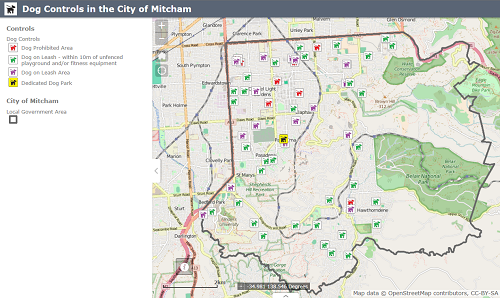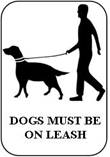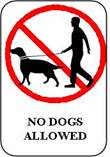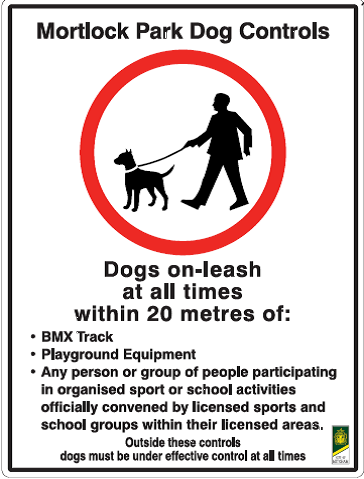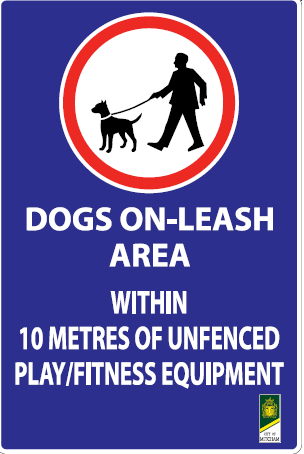Everything you need to know about looking after your dogs in the City of Mitcham, including registration fees, microchipping, parks and recreation, barking, biting and more.
Owning a dog in the City of Mitcham
Owning a dog is one of life’s greatest pleasures, but it does come with huge responsibility. Being a good pet owner means not only understanding their needs, but also being aware of your responsibilities to the community.
Good dog owners:
- Make sure their dogs are properly fenced in at home
- Use a leash when in public spaces
- Train their dogs to not bark excessively
- Stop them from roaming or being aggressive
- Pick up any litter left by them in public
- Make sure they’re registered and identified (so they can be returned if lost!)
Our role
We have a duty to make sure everyone in our community feels safe, and that animal ownership doesn’t create health or safety problems. We will always do our best to help people solve animal management issues without formal action.
Our Dog and Cat Management Plan 2018-2023 sets the direction for managing urban animals within the community for the next five years (as required by the Dog and Cat Management Act 1995) and builds upon the existing animal services we provide.
Your responsibility as a dog owner
Care for your dog
Keeping your pet happy, healthy and safe is a full-time commitment, so before you become a dog owner, it’s important to think carefully about the best kind of dog for your lifestyle.
What breed is best? Will the dog have enough space in your home to run around? Can you devote the necessary time to feeding, training, exercising and socialising the dog? Can you afford veterinary check-ups, vaccinations and food? Ask your local vet for advice if you are not sure.
Microchip your dog
You must microchip your dogs by the time they’re 12 weeks old. Your local yet can do this for you, or visit Chipblitz to get information about their discount microchipping days.
Desex your dog
Dogs born after 1 July 2018 must be desexed by the time they turn six months old (or 28 days after you buy them). Working livestock dogs, as well as dogs and cats owned by registered breeders, are exempt from being desexed, but they do still need to be microchipped.
Manage your dog’s barking
All dogs bark, but some barking dogs become a real nuisance. Continuous barking can reduce people's quality of life and increase neighbourhood tensions.
Barking dogs are the most common animal behaviour problem that we’re asked to deal with. Ongoing barking is often a symptom of another problem, such as frustration, loneliness, or boredom and understanding what makes your dog bark is the first step towards solving it.
Make sure your dog gets plenty of exercise, companionship and has a comfortable, safe, enclosed place to sleep. Obedience training may help stop dogs barking, but if this doesn’t work contact your vet or pet shop for advice. It is important to enrich your dog's world and provide activities that are suitable for the breed of your dog.
If your dog continues to create a persistent noise that interferes with the peace, comfort or convenience of your neighbours, you may be fined or have a Control (Barking Dog) Order placed on the dog.
Animal behaviour expert Tracy Irons shares tools to quieten a dog and leave them feeling peaceful and happy.
Making a noise complaint
If you want to complain about animal noise, try to resolve the issue yourself by speaking with the person responsible for the noise. They may not be aware of the noise, and talking about it face-to-face might mean you can resolve it without getting anyone else involved.
If you are not comfortable approaching your neighbour, the Dear neighbour your dog is barking letter template can be placed in your neighbours letter box as a first step to resolve the issue.
If you can’t come to a compromise, and you want to lodge a formal complaint with us, you’ll need to complete a barking dog log sheet. You’ll need to complete a seven day log sheet to record the details of the barking, followed by a further seven days to establish if the problem continues after we intervene.
Confine your dog
You could be fined if your dog isn’t confined to the yard and leaves the property. You’re liable if your dog attacks a person, another dog or other animal, damages property or causes a traffic accident outside your property.
Most problems with dog bites happen on the owners' properties or at the property boundary lines. Dogs view their territory as their domain and naturally want to protect it. Keep this in mind and don't leave gates open while washing the car or working in the garden.
People have a legal right to access your front door. This means you’re responsible if your dog bites someone going to or coming from the front door. Gas, electricity and water meters must be positioned to allow the readers safe access.
Pick up your dog poo
No one wants to step in a pile of dog poo when they’re out and about. Dog faeces are also a major E Coli polluter when washed into the stormwater system.
When you’re with your dogs in a public place, you must clean up after them. This can easily be done using a scooper and a plastic or paper bag to remove and dispose of the poo.
Discover where you can find free dog poo bags
Train your dog
Puppies should be taught basic manners and the rules of the household as soon as you bring them home.
Consider taking your dog to a local obedience club for training with the help of qualified dog trainers. This also lets your dog socialise with other dogs.
Tell us if you have more than two dogs
If you have more than two dogs over the age of three months on your property, you’ll need to ask us for permission. Download an application form here.
If you don’t tell us, the maximum penalty is $320, with an expiation fee of $80. You may also be charged a continuing offence penalty of $50 every 14 days that the offence continues.
Information for breeders
If you breed dogs and cats for sale, you must register with the Dog and Cat Management Board as a breeder.
For more tips on being a responsible dog owner, visit the Dog and Cat Management Board.
Registering your dog
Registering and identifying your pets and other animals helps to keep your animals safe, gives you peace of mind and means that we can plan for future community needs.
Dog registration FAQs
To register your dog, visit Dogs and Cats Online, the central database for microchipped and registered dogs and cats and registration payments. Breeders must also register their animals at Dogs and Cats Online.
- Renewal notice (only if the dog was previously registered)
- An email address
- Any concession cards
- You may need certificates of microchipping or desexing if this wasn’t previously recorded
- Certificates of desexing or microchipping
If you’re entering a new dog into Dogs and Cats Online, you might need to upload a certificate of desexing or microchipping. If you can’t find your certificate, you’ll need to get another to complete your registration.
To get a microchip certificate, visit Pet Address, and enter your microchip number (you’ll find this on any veterinary documents or invoices).
It’s important to keep your dog’s address and details up to date. The correct details means your renewal code will get sent to the right address, you’ll avoid incorrect fines, and your pet won’t be mistaken for a stray if it goes missing!
Visit Dogs and Cats Online to update your details if:
- You’ve changed your address, name or contact details
- You want to transfer your animal to another owner
- You don’t own a dog anymore
- Your dog dies
From July 2018, dog registration discs in South Australia are issued just once, and not every year. This helps to reduce waste and streamline pet registration.
Registered dogs will be given a permanent registration number and a once-off grey coloured disc. You’ll get a registration number that’s linked to your dog, even if you move to a different Council or if your dog changes owners. You also have a choice to replace the plastic grey disc with an engraved metal disc.
It’s important to know that you’ll still need to renew your dog's registration each year.
Dog and cat registrations are due every year between 1 July and 31 August, no matter when you first registered your pet.
You'll receive your registration renewal in July each year via email, post or SMS.
| Dogs | Price | Concession |
Non-standard dog | $107 | $53.50 |
Standard dog (de-sexed and microchipped | $54 | $27 |
| Puppy (under 6 months of age) | $52 | |
| Assistance Dogs (including in training) | Nil | Nil |
Working Dog or SAGRCB Greyhound Dogs | $53.50 | $26.75 |
| Racing greyhound | $15.00 | $7.50 |
Late Registration Fee | $21 | $21 |
- Registration is valid until July each year (irrespective of when you last paid your registration). This means if you register your dog in June, you'll still need to pay for registration renewal again in July.
- Dogs and Cats Online might charge a late fee if you don’t register your dog on time and we may send you fines as well.
- If your dog dies, you won’t be able to apply for a refund or transfer the registration to another animal.
Your renewal code will be sent to you in July each year by the contact method that you choose when you first registered your dog (this is why it’s important to keep your details updated in your Dogs and Cats Online account).
Dogs and Cats Online will send you a plastic registration tag/disc when your dog is first registered, and this is a lifetime disc. If you need a replacement disc, you can buy one from Dogs and Cats Online for $10. Or if you know your dog’s registration number, you can have this engraved on a metal disc along with your dog's name and any other contact details.
Yes, it’s compulsory to microchip your dog by the time they’re 12 weeks old. Your local yet can do this for you, or visit Chipblitz to get information about their discount microchipping days.
It’s compulsory for dog owners, breeders, councils, vets, microchip implanters, the RSPCA, the Animal Welfare League, assistance dog organisations and others to give information to the Dogs and Cats Online system. Dogs and Cats Online helps us and other organisations (like the RSPCA) continue to keep animals and communities safe.
For example:
- An officer at the City of Mitcham can update a dog owner’s record to indicate that they’ve paid their annual dog registration fee, and that the dog is now registered.
- An officer at the City of Mitcham can get information from Dogs and Cats Online so they can investigate a breach of the Dog and Cat Management Act and prosecute the offender.
- An RSPCA inspector can get information from Dogs and Cats Online so that they can investigate and prosecute animal cruelty cases and other breaches of the Animal Welfare Act.
- A registered vet and their staff can search Dogs and Cats Online for a dog already in the Dogs and Cats Online system. They’ll be able to see the name and phone number of the owner, and then update the dog’s microchipping and de-sexing information.
The Dog and Cat Management Board makes decisions in line with the SA Government Information Privacy Principles about how much information officers can get access to. Dogs and Cat Online incorporates the public register of dog and cat breeders in SA, and not all the information about breeders held within the system is accessible to the public.
If you have an assistance dog, it needs to be accredited by the Dog and Cat Management Board. We can’t accredit your assistance dog (as much as we’d like to!).
You’ll need to visit Dogs and Cats Online, complete an application form, and provide the information they ask for. If you meet the criteria, you’ll be asked to do a Public Access Test with an approved assessor.
This test costs $120/hour and can go for 3.5 hours. If you’re successful, you’ll be issued with a Board Assistance Dog Identification Card, which may expire after a set period of time (like two years).
You can apply for a dog business registration if the business involves:
- a kennel at which dogs are bred or trained; or
- the provision of security or other services involving the use of dogs.
You’ll find information about registering a dog business under Section 35 of the Dog and Cat Management Act. To register your business call us on 1300 133 466.
If you’re not already part of a breeder’s association, you’ll need to register as a breeder at the same time that you register your dog.
Registration fees mean that we can:
- Help lost or injured dogs be reunited with their owners
- Regularly communicate with dog owners and the public
- Create resources to develop dog management programs and to support legislation
- Provide funding to support of pounds and shelters
- Provide funding for community education, and administrative and research expenses of Councils
- Support by-law control
- Enforce effective dog control legislation, and control and reduce dog problems for the community (such as investigating barking dog complaints and dog attack complaints
A quarter of all dog registration income goes directly back to the Dog and Cat Management Board, and this helps the City of Mitcham become a member of the Board. The Board is responsible for:
- Providing information and advice about the act and their responsibilities
- Acting as a conduit of information between state and local government
- Undertaking radio and television advertising campaigns to raise the awareness of being a responsible pet owner
- Producing and providing councils with a range of brochures and publications
- Providing the public with an avenue to utilise when they believe councils haven’t acted in accordance with the law
If you have lost or found a dog, please call 1300 133 466.
What to do if a dog attacks
After a dog attack, get medical or veterinary treatment as soon as possible, and report the attack to the relevant council. If the attack happens in the City of Mitcham, call our Community Safety team on 1300 133 466.
Report the incident as soon as possible
Like all serious incidents, time is a critical factor in dealing with dog attacks. This is especially important if the offending dog is wandering at large and poses a risk to the public or other animals. To help our officers, please try to get the following information before contacting us:
- The date, time, and exact location of the attack. If you’re not sure, use your GPS equipped smartphone to check on a map
- A description of the offending dog, including registration disc, name tag, breed, colour, sex, markings, collar size and colour
- A description of the owner, including name, address, contact phone number, male or female, age, hair colour, clothing
- If a car was involved and the offender drove away with the dog, try and get the car registration number, make, model, colour
- A description and photographs of any injuries and location on your body or your pet's body.
You should also keep copies of any medical certificates, vet, or doctors’ bills as evidence.
What happens when a dog is reported?
- One of our authorised officers may take a statement or affidavit from you
- Photos may be taken of any injuries to yourself, or your animals or birds
- The dog's owner may be contacted to get their side of the incident
- Officers may get witness statements and other evidence
- Officers will look at the circumstances and evidence, and make a decision for action
- If needed, we’ll then send out legal notices
Who is responsible for a dog attack?
You’re responsible for your dog’s actions. It’s an offence for a dog to attack, harass or chase a person, another animal or a bird owned by a person.
Depending on how severe the attack is, we may:
- issue a warning
- impose an on-the-spot fine of $315
- take direct court action (in more serious cases)
- impose a control order (Nuisance Dog, Dangerous Dog, Menacing Dog or Destruction Order)
The maximum penalty for a dog attack is $2,500.
Preventing dog bites
Dogs bite for lots of reasons. The most common are fear, pain or confusion, and ignoring signs of aggression may result in serious injury to you, a member of your family or others. You can discourage biting by:
- socialising your dog from an early age so that it learns how to mix with other dogs and other people in public
- avoiding situations that may cause your dog to become nervous or anxious
- training your dog — obedience classes will help you learn about your dog, its body language and how you can communicate with it
- desexing your dog can make your dog less aggressive. Note that de-sexing your dog is mandatory (with exemptions)
- asking your vet for advice if your dog shows any signs of aggression towards people.
For more information on being a good dog owner, visit the Dog and Cat Management Board.
How to protect your pet in an emergency
- Include pets in your survival plan
- Prepare your pet emergency kit
- Practice your plan
How to prepare your pet emergency kit
The kit should include:
- Registration certificates
- Vaccination certificates
- Transportation equipment (cages/carriers/crates/horse floats etc)
- Cat litter and tray
- Poo bags for dogs
- ID tag (including pets name and your mobile phone number), collars, leads, harnesses, saddles etc
- Food and water bowls, and at least one week’s supply of non-refrigerated food
- Medications and clear instructions for treatment of any medical conditions
- Blankets/bedding/nesting material
- Toys/enrichment devices
- Photograph of your pets (including names) in sealed plastic bags
- Contact details for your vet, local animal shelter, local council, and alternative animal accommodation facility
Dog leash and dog free areas
When you’re in a public place (like roads, streets, footpaths), your dog must be on a leash that’s no more than two metres long. When you’re in a park or reserve, you must be able to control your dog by voice command, and must be in your sight at all times.
Dog free areas (no dogs allowed at any time)
- the enclosed playground area of Apex Park Reserve
- the enclosed children’s playground area of Bailey Reserve
- the fenced soccer pitch of Bailey Reserve
- Barrans Reserve
- the enclosed playground area of Blackwood Hill Oval
- Crozier Reserve
- Denman Reserve
- Goodale Reserve
- Kingswood Oval
- Portland Place
- the enclosed playground area of Price Memorial Oval
Areas where your dog musts be on a leash
- the portion of Apex Park Reserve north of Watahuna Avenue
- the enclosed portions of Avenue Road Reserve comprising fitness equipment and the playground
- the portion of Bailey Reserve excluding the fenced soccer pitch at all times when organised sports and official sports training are in progress
- Burbank Reserve
- CC Hood Reserve except during the following times:
- daily from 1 April to 31 October (inclusive) between 7am to 9am and 5pm to 8pm; and
- daily from 1 November to 30 March (inclusive) between 7am to 9am and 6.30pm to 9.30pm
- Donald Reserve
- Haddington Reserve
- Hillview Penang Reserve
- Keith W Pearson Reserve
- Mitcham Reserve
- Naomi Reserve
- Nunyara Reserve (Thompson Playground)
- Price Memorial Oval between the hours of 11am and 4pm daily and otherwise during such times as sporting activities are being undertaken
- Riverside Drive Reserve
- Strathcona Reserve
- Waverley Street Reserve
Dog on leash areas (within 10m of an unfenced playground and/or fitness equipment)
- Archibald Reserve
- Batchelor Reserve
- Balham Reserve
- Thurles Reserve
- Alexander Ross Reserve
- Birksgate Reserve
- Delwood Reserve
- Donnybrook Reserve
- Francis Reserve
- Godden Reserve
- Hewett Sports Ground
- Highfield Reserve
- Jackson Reserve
- Karinya Reserve
- Kegworth Reserve
- Kent Reserve
- Manson Oval
- Marion Reserve
- Mead Crescent Reserve
- McElligotts Quarry
- Meadowbank Reserve
- Monalta Reserve
- Netherby Reserve
- Norman Reserve
- Ossie Goldsworthy Reserve
- Pasadena Reserve
- Piazza Reserve
- Rozelle Reserve
- Sherwood Reserve
- Suffolk Reserve
- Sierra Nevada Reserve
- Thiselton Reserve
- Whicker Reserve
- Woodlake Reserve
- Waite Reserve
Dog on leash areas (within 20m)
When you are at Mortlock Park in Colonel Light Gardens, all dogs must be kept on-leash when they’re:
- within 20 metres of the BMX track at all times
- within 20 metres of playground equipment at all times
- within 20 metres of any person or group of people participating in organised sport or school activities officially convened by licensed sports and school groups within their licensed areas
Click on the map to understand dog control areas in the City of Mitcham.
Dog control signage
As well as the Dog Controls on Reserves that you can see on the map above, all other reserves and parks require dogs to be under effective control (either by physical restraint or by way of voice command) unless a sign says otherwise. All dogs must be on a lead on a street or road, unless otherwise stated by signage.
|
|
You’ll see these signs at the entrance or on the main pathways of all dog-restricted areas. You’ll need to follow these signs, or you may be given an on-the-spot expiation notice without warning.
If your dog is a nuisance, penalties may apply.
Dedicated dog park
Dedicated dog parks give your dog the opportunity to have a run around, socialise with other pups, enjoy the fresh air, practice training techniques, play games, and burn off energy.
These activities are super important for physical health, because they help prevent problems such as obesity. They also provide essential mental stimulation and prevent the development of problem behaviours, like destructiveness or excessive barking
It’s important to know that not all dog parks are suitable for all dogs. Watch our top ten tips for enjoying dog parks here.
There is one dedicated dog park in the City of Mitcham:
CC Hood Reserve dedicated dog park
The CC Hood Dedicated Dog Park at Eliza Place in Panorama is a purpose-built dedicated dog park, located at the northern portion of CC Hood Reserve. The fully enclosed 1.5 metre fence means dogs can exercise freely off the leash in a safe environment.
The park includes shelters, bench seating, water dispensers, rubbish bins, poo bag dispensers, and play equipment for dogs, including rails, posts, and pipes.
Follow the signs from the corner of Eliza Place and Springbank Road, or the corner of Fiveash Drive and Grandview Drive, Panorama.

